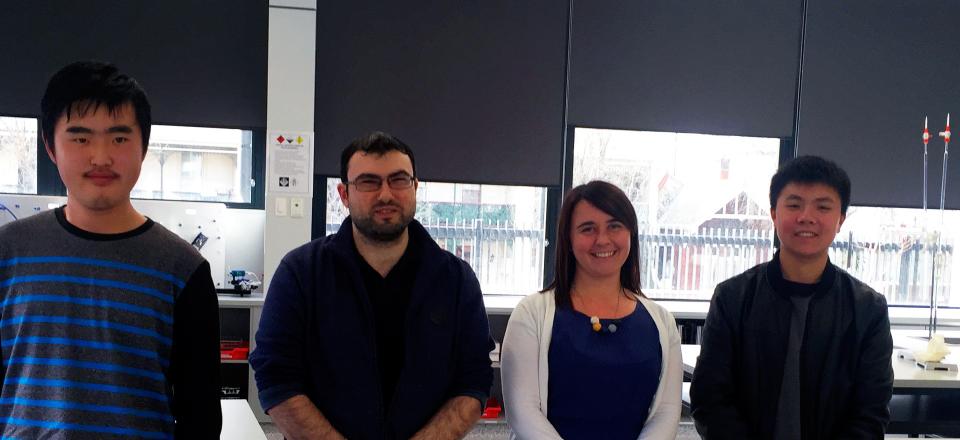How Bio21 researchers helped Elizabeth Blackburn VCE students do some real science

Period 1 – Maths
Period 2 – Chemistry
Period 3 - Cure Ebola
Period 4 - English.
It’s not a typical class schedule. But then, the Elizabeth Blackburn School of Science (EBSS) is not a typical high school. While most would-be scientists are stuck in the classroom, EBSS students are collaborating with working scientists to do real science, through a VCE subject with a difference.
The Extended Investigations VCE subject challenges Year 11 EBSS students to take on a year-long research project, working with mentors from the University of Melbourne and the Bio21 Molecular Science and Biotechnology Institute.
One of these students, Ryan Huang, is researching the effectiveness of several potential treatments for Ebola, under the supervision of Ashley Callahan, a research assistant investigating Dengue transmission with Professor Ary Hoffman’s Bio21-based lab team. Ryan is comparing data from animal trials for three possible Ebola treatments to work out which treatment is most effective.
If that wasn’t challenging enough for a Year 11 student Ryan would like to expand his research project to include recent data on human trials, rather than relying on data from animal trials alone.
Ryan and Ashley meet weekly during class time allocated to the subject, but also keep in regular email contact outside of school hours. Ryan says the guidance of an experienced researcher in Ashley really helped him develop his research project.
“Ashley has taught me how to structure and sort through my information, especially on how to write reports, and she’s also helped me find some research articles, journals and papers”, says Ryan.
“She’s also shared with me some of her experience in writing reports and doing oral presentations.”
Fellow student Wesley Tran echoes these sentiments. He is being mentored by University of Melbourne Masters of Bioinformatics student Damien Zammit on his research into optimal lighting for non-real time computer visual tracking.
This sounds like a complicated project, but Wesley politely assures us that the research “is actually very simple”. He says a good example of this kind of research is a tennis match, in which the landing position of the ball is tracked using the Hawk-Eye system. If it is too bright or too dark, then the computer won’t be able to see, and thus track, the movement of the ball.
He has high praise for Damien’s help.
“Not only has he helped me with my research question, he also helped me with other important skills I needed to continue my research, for example, critical thinking skills and journal reading,” said Wesley.
“It’s just very great to have such a mentor.”
Ashley and Damien understand the importance of good mentorship for aspiring scientists, having both benefited from similar programs as students themselves.
Ashley credits a high school program that placed her in a science laboratory at her local university in Canada with helping to refine her interest in science, while Damien is an alumnus of University High, which hosts the Elizabeth Blackburn School of Science.
Given their choice of school, it is not surprising that Ryan and Wesley are long-term science enthusiasts. They both appreciate the opportunity to focus their academic efforts on the subjects they love, with like-minded peers.
“It’s a really close-knit community here,” said Ryan, who transferred to EBSS this year.
Wesley, who has been at the University High campus for his entire secondary schooling, agrees.
“It just seemed really nice to be able to come to a science and mathematical school … science can explain so many things,” he said.
“I’m passionate about it.”
Ashley and Damien share not only their apprentices’ passion for science, but also their appreciation for the mentorship program. They say being mentors has allowed them to improve their communication and leadership skills through sharing their knowledge and supporting the students.
They are proud of their mentees and the efforts they’ve put into their research projects.
“I am very impressed, Ryan’s a very smart student and he’s becoming an expert in Ebola,” said Ashley, with a broad smile for her shy student.
As Ryan, Wesley and their fellow students continue on their paths towards further study and perhaps careers in science, perhaps they will recognise the importance that mentors have played in their career progression, and will themselves become mentors for enthusiastic young science students.
By Claire Bolge, Communications and Events Officer, Faculty of Science

